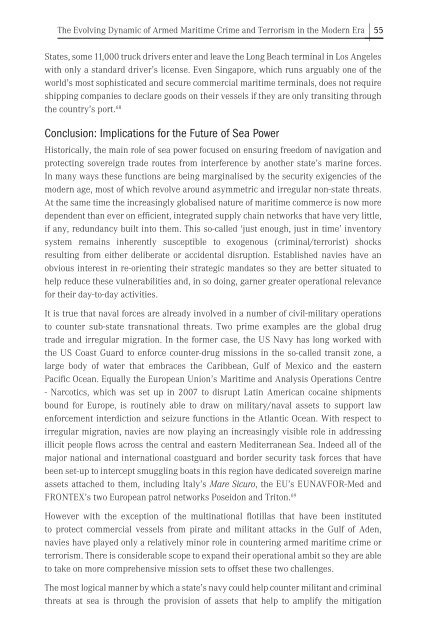THE FUTURE OF SEA POWER
SPC2015_Proceedings
SPC2015_Proceedings
Create successful ePaper yourself
Turn your PDF publications into a flip-book with our unique Google optimized e-Paper software.
The Evolving Dynamic of Armed Maritime Crime and Terrorism in the Modern Era | 55<br />
States, some 11,000 truck drivers enter and leave the Long Beach terminal in Los Angeles<br />
with only a standard driver’s license. Even Singapore, which runs arguably one of the<br />
world’s most sophisticated and secure commercial maritime terminals, does not require<br />
shipping companies to declare goods on their vessels if they are only transiting through<br />
the country’s port. 68<br />
Conclusion: Implications for the Future of Sea Power<br />
Historically, the main role of sea power focused on ensuring freedom of navigation and<br />
protecting sovereign trade routes from interference by another state’s marine forces.<br />
In many ways these functions are being marginalised by the security exigencies of the<br />
modern age, most of which revolve around asymmetric and irregular non-state threats.<br />
At the same time the increasingly globalised nature of maritime commerce is now more<br />
dependent than ever on efficient, integrated supply chain networks that have very little,<br />
if any, redundancy built into them. This so-called ‘just enough, just in time’ inventory<br />
system remains inherently susceptible to exogenous (criminal/terrorist) shocks<br />
resulting from either deliberate or accidental disruption. Established navies have an<br />
obvious interest in re-orienting their strategic mandates so they are better situated to<br />
help reduce these vulnerabilities and, in so doing, garner greater operational relevance<br />
for their day-to-day activities.<br />
It is true that naval forces are already involved in a number of civil-military operations<br />
to counter sub-state transnational threats. Two prime examples are the global drug<br />
trade and irregular migration. In the former case, the US Navy has long worked with<br />
the US Coast Guard to enforce counter-drug missions in the so-called transit zone, a<br />
large body of water that embraces the Caribbean, Gulf of Mexico and the eastern<br />
Pacific Ocean. Equally the European Union’s Maritime and Analysis Operations Centre<br />
- Narcotics, which was set up in 2007 to disrupt Latin American cocaine shipments<br />
bound for Europe, is routinely able to draw on military/naval assets to support law<br />
enforcement interdiction and seizure functions in the Atlantic Ocean. With respect to<br />
irregular migration, navies are now playing an increasingly visible role in addressing<br />
illicit people flows across the central and eastern Mediterranean Sea. Indeed all of the<br />
major national and international coastguard and border security task forces that have<br />
been set-up to intercept smuggling boats in this region have dedicated sovereign marine<br />
assets attached to them, including Italy’s Mare Sicuro, the EU’s EUNAVFOR-Med and<br />
FRONTEX’s two European patrol networks Poseidon and Triton. 69<br />
However with the exception of the multinational flotillas that have been instituted<br />
to protect commercial vessels from pirate and militant attacks in the Gulf of Aden,<br />
navies have played only a relatively minor role in countering armed maritime crime or<br />
terrorism. There is considerable scope to expand their operational ambit so they are able<br />
to take on more comprehensive mission sets to offset these two challenges.<br />
The most logical manner by which a state’s navy could help counter militant and criminal<br />
threats at sea is through the provision of assets that help to amplify the mitigation


